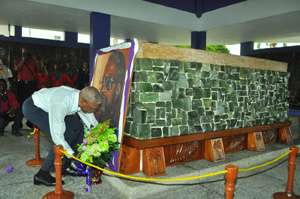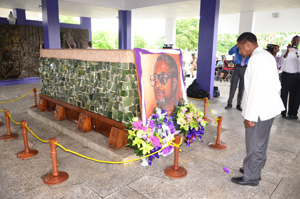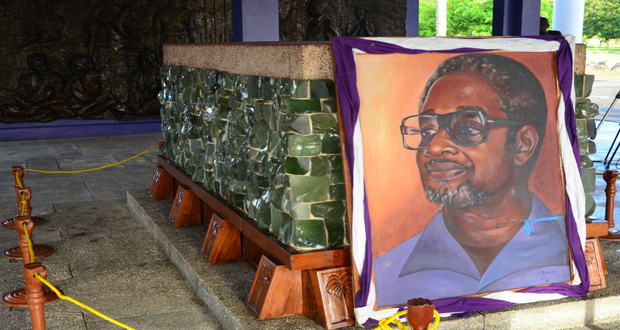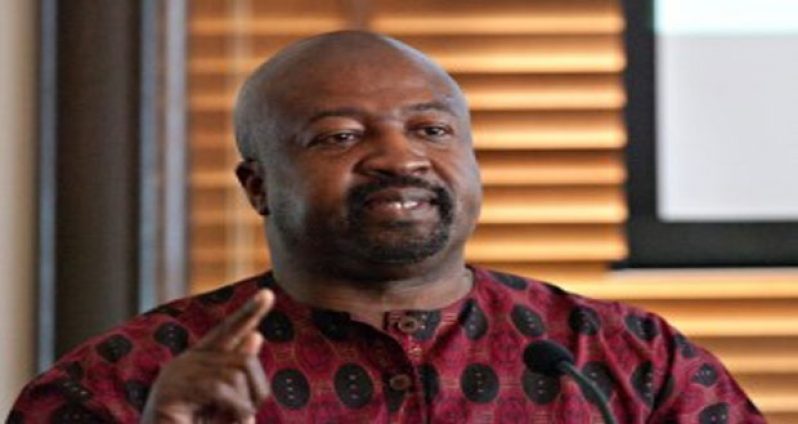By David Hinds
AUGUST 6, 2015 was the 30th death anniversary of former President of Guyana, Forbes Burnham. Although his party, the PNC and the Burnham Foundation marked the day with activities, the country as a whole did not celebrate his life and contribution to Guyana.
The truth is that despite his large place in our country’s recent political history, Burnham is hardly known by most of the younger citizens who were born after 1985. And many of those who know of him, their knowledge is confined to a name.

This is a sad commentary on where we are as a country. Burnham, like all of our political stalwarts, has become a victim of our continuing divisive politics. We have not yet been able to dispassionately relate to our political leaders outside of the political narratives we have constructed for the purposes of political advantage and the attainment and maintenance of political office.
The consequences is that the full worth and contributions to our national tapestry of four of our great political leaders – Forbes Burnham, Cheddi Jagan, Eusi Kwayana and Walter Rodney – are lost in the rough and tumble of our politics of ethnic insecurity and partisan hegemony.
Those who love Burnham construct him as a visionary saint with no faults, while his detractors present him as the worse evil who destroyed Guyana. Both characterisations are patently wrong. While Burnham was indeed a visionary and a most able leader, he was by no means a saint.
Conversely, while he was a leader who made his fair share of mistakes, he was not the devil he has been made out to be by some of his detractors. The problem is that our ‘good vs evil’ political discourse traps us in a place from which we have been unable to extricate ourselves.
I do not intend to do an analysis of Burnham and his politics here. But I hasten to point out that Mr Burnham has to be analysed and evaluated within the context of his times and his challenges. To try to understand him outside of his time is the ultimate in political dishonesty.
Burnham was part of the immediate post-colonial generation that took over the reins of power from the colonial masters. The colonials were leaving, but they left behind the colonial state.
Our new post-colonial leaders were, therefore, granted enormous powers by an inherited political system that was created for kings and conceived to dominate.

In addition, since they were the ones who had led the children out of bondage, the followers were less vigilant and more accommodating of their political frailties. It is no accident then that the leadership in Guyana, the rest of the Caribbean, Africa and Asia succumbed to the authoritarian trappings of power. In the end, political power was personalised and became absolute. This is a crucial aspect of the making of a Forbes Burnham, a Cheddi Jagan, an Eric Williams or an Eric Gairy.
Yet, these were men who were deeply invested in doing something to lift the lot of their peoples. They were acutely aware of the scourge of poverty and marginalisation. In Burnham’s case, the fact that he was dark-skinned in a world that privileged white and brown made him even more sensitive to the reality of the social bottom.
These concerns would be reflected in some of the policies he enacted and in the general socio-economic thrust he championed. Redistribution of wealth as a means of lifting up the powerless was a central part of his praxis.
In addition to the above, Burnham and his generation were nationalists. Burnham’s fostering of Guyanese, Caribbean, Pan-African and Third World nationalisms was peerless. In the process he brought a sense of national dignity to Guyana.
Burnham, then, was a paradox – the visionary defender of the poor and the nation who succumbed to the lure of authoritarian rule. But the Burnham paradox is a Guyanese and Caribbean paradox that must be worked through and properly explained. We do Burnham and ourselves a disservice by succumbing to the ‘good vs. evil’ paradigm. In the end, we sink deeper into the dangerous politics of them and us.

(Dr David Hinds, a political activist and commentator, is an Associate Professor of Political Science and Caribbean and African Diaspora Studies at Arizona State University. More of his writings and commentaries can be found on his YouTube Channel Hinds’Sight: Dr. David Hinds’ Guyana-Caribbean Politics and on his website www.guyanacaribbeanpolitics.com. Send comments to dhinds6106@aol.com)












